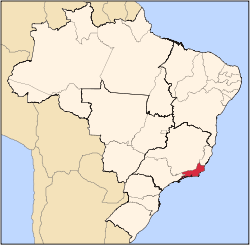Rio das Ostras
Rio das Ostras (Portuguese pronunciation: [ˈʁi.u dɐz ˈostɾɐs], locally [ˈχi.ʊ̆ dəjˈz‿o(j)ɕtɾəɕ]) is a municipality located in the Brazilian state of Rio de Janeiro.
Rio das Ostras | |
|---|---|
Municipality | |
| Município de Rio das Ostras | |
 Flag  Seal | |
 Location of Rio das Ostras in the state of Rio de Janeiro | |
 Rio das Ostras Location of Rio das Ostras in Brazil | |
| Coordinates: 22°31′37″S 41°56′42″W | |
| Country | |
| Region | Southeast |
| State | |
| Area | |
| • Total | 228.044 km2 (88.048 sq mi) |
| Elevation | 4 m (13 ft) |
| Population (2018 est.[2]) | |
| • Total | 145,989 |
| • Density | 640/km2 (1,700/sq mi) |
| Time zone | UTC-3 (UTC-3) |
The municipality has been suffering from environmental impacts due to the pollution of beaches, rivers and lagoons due to lack of basic sanitation and environmental degradation due to illegal occupations in areas of environmental protection (APAs) for the protection and conservation of biotic attributes (fauna and flora). The inland discharge of clandestine sewage from homes and businesses has been causing eutrophication in the ecosystem in an aggressive way.
The systemic corruption of the municipality began from its political-administrative emancipation on April 10, 1992, and destroyed much of Rio das Ostras that to date there is no type of basic sanitation. The lack of potable water, sewage, public road paving and public transportation are old and systemic problems for a municipality that received trillions in oil royalties.
Nowadays, much of the coastline of Rio das Ostras suffers from the advance of the sea, erosions and uneven irregular constructions. In the urban area there is a significant increase in slums, violence, unemployment and social inequality. The lack of basic sanitation affects every municipality.
General
Its population is 145,989 (2018) and its area is 228 km².[1]
References
- "Brazilian Institute of Geography and Statistics" (in Portuguese). 2017. Retrieved 27 March 2019.
2018 Area Total
- "Brazilian Institute of Geography and Statistics" (PDF) (in Portuguese). 2018. Retrieved 6 March 2019.
2018 Estimates of Population
